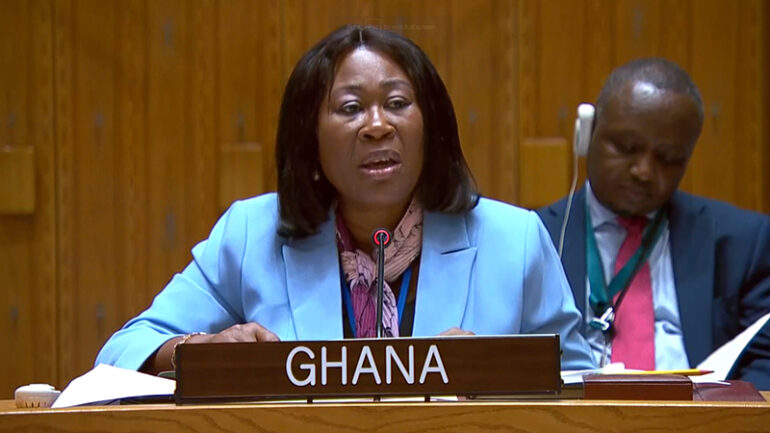UNSC Debate on International Residual Mechanism for Criminal Tribunals

Ambassador Jane Gasu Aheto (Mrs)
Director, Legal and Treaties Bureau,
Ministry of Foreign Affairs and Regional Integration of Ghana
New York, June 13, 2023
ON THE DEBATE IN RESPECT OF THE REPORT BY THE PRESIDENT OF THE INTERNATIONAL RESIDUAL MECHANISM FOR CRIMINAL TRIBUNALS (IRMCT)
Madam President,
I wish to thank Judge Graciela Gatti Santana, President of the International Residual Mechanism for Criminal Tribunals (the Mechanism) and Mr. Serge Brammertz, Prosecutor of the Mechanism, for their insightful briefings to this Council, which provides Council members with an overview of the progress of work as well as the challenges facing the Mechanism.
Madam President
My delegation remains convinced that the Mechanism has an important role in ending impunity and bringing perpetrators of atrocity crimes to justice and will continue to support every effort and work constructively with other delegations in this regard. With regard to the contents of the report, Ghana will like to make the following three points:
1. On cooperation, Ghana continues its call on all States to cooperate with the Mechanism in accordance with applicable laws by handing over fugitives to enable the judicial process to continue and be completed. It may be noted that 153 States have said “no to atrocity crimes” through the Genocide Convention, and we urge those States that are still harbouring identified fugitives to hand them over in fulfillment of their international obligations. We also call for the cooperation of States in the enforcement of sentences.
2. Ghana has always maintained that as a comity of nations, we have a collective Responsibility to Remember the survivors and families of victims of these atrocity crimes that have been committed and to sustain the demands of justice and accountability without limitation over time. We underscore that the wheels of justice may sometimes grind slowly, however, it is also our collective Responsibility to seek justice for them by holding accountable the perpetrators of the heinous crimes of atrocity. The only way these survivors and the families of victims can find closure is for the perpetrators of such heinous crimes to be brought to justice.
3. On the challenges facing the Mechanism in relocating persons who have been acquitted or have completed their sentences pursuant to Resolution 2529 (2020), Ghana regrets to note that such persons who were sent to Niger are still being kept in a safe house against their will given the withdrawal of Niger from the cooperation agreement signed with the United Nations. Ghana wishes to, once again, draw attention to the challenges facing the Mechanism in implementing the Resolution. It is pertinent to state that the international justice community has to pay attention to and resolve the situation of the acquitted and the released persons who have completed their sentences. The continued lack of liberty of these persons remains a stain on international justice and perpetuates a well-founded criticism that international justice has failed to ensure and implement fundamental human rights.
As we commend the efforts of the Registrar for using diplomatic, political, and judicial avenues to resolve some of the challenges, we call on this Council to critically discuss the matter with an outcome that will assist the Mechanism in line with resolution 2637(2022). Ghana wishes to reiterate Preambular paragraph 5 of the resolution stated, and I quote “Notes that decisions on the relocation of persons who have been acquitted or completed their sentences should take into account inter alia the readiness of the state of origin to accept its nationals, the consent or any objections raised by the individuals to be relocated and the availability of other relocation states”. Ghana remains convinced that paragraph 5 sets the tone for an in-depth discussion by this Council. The proposal is being made against the backdrop that more of such persons will be released in the future, and faced with the fact that not many states have expressed interest in taking in these persons of late, how long will the Mechanism continue to take such responsibilities which also has budgetary implications.
4. Finally, Ghana continues to note with appreciation the collaboration between the Office of the Prosecutor and the national prosecutions by providing them with access to evidence and information in response to a high volume of requests for those crimes. This is a positive development as it helps build the Officers’ capacities in the national prosecutions of the affected countries.
I thank you, Madam President.
